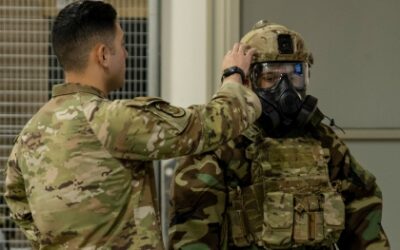While it is well known that veteran populations have higher lung cancer incidence and worse overall survival compared with non-veteran populations, it is not clear how VA lung cancer patients perceive their care.
Patient Selection for Lung Cancer Screening Is Less Than Optimal
Clinician judgment, not patient characteristics, often is the deciding factor in which VA patients are screened for lung cancer, according to a new study.
Deployment Status Plays a Role in Epilepsy Development After TBI
Deployment history appears to play a role in the association between traumatic brain injury (TBI) and epilepsy in recent veterans—but not always in an obvious way.
Military Healthcare Beneficiaries Have Better NSCLS Survival.
Does the universal healthcare provided by the U.S. military health system (MHS) mean better lung cancer survival for patients? A new study suggested that is the case.
Even Mild COVID-19 Infections Caused Impaired Fitness in Military Personnel
Healthy, young members of the military who have had COVID-19 may experience impairments in fitness up to a year after their acute illness has resolved
VA Trying to Pick Up Slack for Rural Veterans Losing Community Healthcare
VA has long struggled to provide care to veterans in rural areas of the country. Veterans living there are frequently required to drive long distances to VA hospitals, and smaller VA clinics are not always available.
White Patients Much More Likely to Receive Knee Arthroplasty In MHS
The U.S. Military Health System is touted as an equal-access medical provider, and scores of studies have demonstrated that few racial inequities exist in the treatment it provides for many conditions.
Critics Strongly Condemn New VA/DoD Guideline on PTSD Treatment
The new VA/DoD posttraumatic stress disorder (PTSD) clinical practice guideline, published late last year, has drawn strong criticism from some experts in the field.
The fear of death follows from the fear of life. A man who lives fully is prepared to die at any time.
New Year’s Eve 2023 was marked with sadness for my family as my mother-in-law, Susan “Sue” Timperley, passed. Leave it to Sue to pass with fireworks and parties in full swing. She was a vital force within our family, a calming influence on the males of our clan, an example for all and a tireless advocate for her grandchildren. Although she was just a slip of a woman, 5 feet tall and 100 pounds soaking wet, woe to anyone who would mistakenly assume her petite physical appearance belied weakness of character.
Real-World Pneumonitis Rates After Chemotherapy Plus Durvalumab
ANN ARBOR, MI – While adjuvant durvalumab after definitive chemoradiotherapy (CRT) for unresectable stage III non-small cell lung cancer (NSCLC) is well-tolerated in clinical trials, that is not always the case in the real-world, according to a new VA study....
NSCLC Survival Rates Higher with Distant Recurrence vs. De Novo Metastasis
PALO ALTO, CA – Even with new and improved therapies, clinicians remain challenged by how to deal with advanced lung cancer. “The survival profile of patients with metastatic lung cancer remains poorly understood by metastatic disease type (i.e., de novo stage IV vs....
Biomarkers Predict Survival, Risk of Adverse Effects in Metastatic NSCLC
ANN ARBOR, MI – Lung cancer outcomes have been significantly improved with the use of immune checkpoint inhibitors (ICI), although some patients derive only limited benefit from the therapy and others experience potentially serious toxicities. That’s why a new study...
Despite Little Down Time, New Oracle-Cerner EHR Not Popular With Staff
According to VA, at least one aspect of its new Oracle-Cerner electronic health record (EHR) system is showing demonstrable improvement–a reduction in the number of times the system as a whole has been offline and inaccessible.
Concurrent Steroids Do Not Reduce Cancer Drugs’ Effectiveness
Immune checkpoint inhibitors (ICIs) have played a crucial role in the field of immuno-oncology over the past decade, substantially improving the prognosis of different cancers.
Nearly 20% of Veterans Showed Decline During Pandemic
While most U.S. veterans maintained or improved physical and mental function a year into the COVID-19 pandemic, almost 20% showed a decline, according to a new study.
Higher Dose Flu Vaccines Don’t Reduce Cardiopulmonary Events
Higher dose influenza vaccines don’t appear to reduce risk of cardiopulmonary events during periods of increased, local flu activity, according to a recent study.
Immune Suppressive Drugs Increase Risk for Severe COVID-19
The risk of severe COVID-19 despite vaccination is substantial in patients taking immune-suppressive drugs, and their risk is much greater than patients with inflammatory diseases.
Prostate Cancer Outcomes Not Affected by FSH Levels
The standard treatment for advanced prostate cancer (PC) is androgen deprivation therapy (ADT), usually delivered via a luteinizing hormone-releasing hormone (LHRH) agonist.
Toxicities From PARP Inhibitors for Prostate Cancer
Poly ADP-ribose polymerase inhibitors (PARPis) are an important class of therapeutics for metastatic castration-resistant prostate cancer (mCRPC),
Black Veterans 50% Likelier to Get Prostate Cancer Diagnosis on First Biopsy
Black men are more likely than non-Hispanic white men to develop and die from prostate cancer, yet not much data exists that is specific to prostate-specific antigen (PSA) screening protocols by race.
With High Awareness of Long COVID, Researchers Put Spotlight on Long Flu
Clinicians are well aware of long COVID, the enduring health conditions caused by the SARS-CoV-2 virus’ ability to attack multiple organ systems.
Oral Antiviral Drug Paxlovid Reduced Only Some Post-COVID-19 Conditions
Nirmatrelvir-ritonavir, an oral antiviral drug used to treat COVID-19, only appears to reduce some post-COVID-19 conditions, such as combined thromboembolic events, according to a recent study.
War on Terror Created High Rates of Ocular Trauma in U.S. Servicemembers
The rate of combat ocular trauma in Operations Iraqi Freedom and Enduring Freedom exceeded that of any past U.S. conflict. A new study looked at the long-term effects of the devastating battlefield injuries.
Emerging Chemical Threats Affect Eyes Differently, Require Special Care
As chemical agent exposure remains a threat to military servicemembers, it’s important to consider that each chemical agent affects the eye differently and requires appropriate treatment, according to a recent review article.
Homeless Veterans More Likely to Receive Risky Benzodiazepine Prescriptions
Despite an elevated risk of mental illness and substance use disorder in most homeless populations, a scarcity of research exists on the use of psychiatric medications and understanding of prescribing practices among providers for these populations.
Multilevel Intervention Aligns Colorectal Cancer-Screening Use With Benefit
Each year, the VA diagnoses some 4,000 new cases of colorectal cancer (CRC) in veterans. Colorectal cancer screening can help detect cancer early, when it is most treatable. But the benefits of screening in older adults varies by individual, according to a new study.
Legislators Raise Concerns About Lack of Background Checks at VA
VA apparently lacks the personnel needed to complete timely background checks on all new staff, resulting in employees going to work at VA hospitals without ever being fully vetted, according to a legislator.
VA Healthcare, Fourth Mission Face Stresses From Continued Climate Change
With a worsening climate crisis, VA expects to be called upon more and more to implement its fourth mission—to act as a backstop for the nation’s overall healthcare network during times of emergency.
Telehealth Offers Promising Alternative to Traditional Sleep Medicine Care
Insufficient and disturbed sleep, as well as clinical sleep disorders such as obstructive sleep apnea, shift work disorder and nightmare disorder, are highly prevalent in the U.S. military and can result in increased accident risk and diminished military readiness.
Veterans Treated in VAMCs for Some Common Conditions Had Better Outcomes
Outcomes were better for some common conditions among veterans treated in VA hospitals compared to community care, but the tradeoff often was higher resource use.








